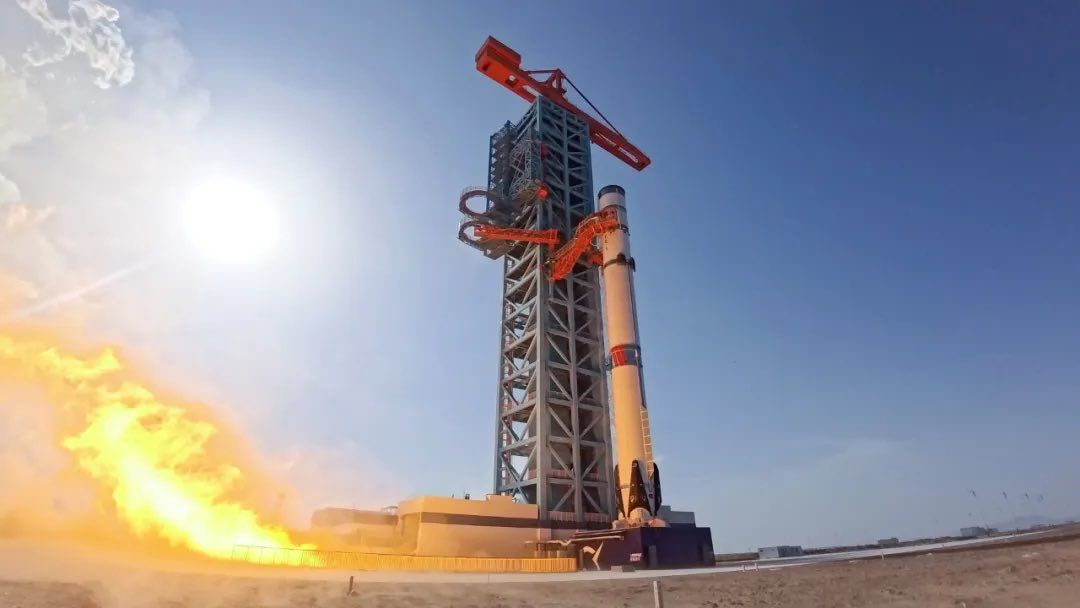Science
China’s LandSpace Advances with Successful Static-Fire Test

China has made significant strides in its space exploration efforts with the successful static-fire test of its first reusable rocket, the Zhuque-3. Conducted by the Chinese company LandSpace on October 20, 2025, this test marks an important milestone as the company aims for a debut flight before the end of the year.
The static-fire test, a routine prelaunch procedure where a rocket ignites its engines while secured to the launch pad, was part of the “first phase” of Zhuque-3’s maiden flight campaign. This phase also included a fueling test, both of which took place at the Dongfeng Commercial Space Innovation Pilot Zone in northwestern China.
LandSpace announced via social media that the rocket will undergo a vertical integration rehearsal before returning to its technical zone for inspection and maintenance in preparation for its upcoming orbital launch and first-stage recovery. This systematic approach reflects the company’s commitment to ensuring the reliability of the Zhuque-3.
Technical Details of Zhuque-3
The Zhuque-3 shares a striking resemblance to SpaceX’s Falcon 9, featuring a reusable first stage and an expendable upper stage. The rocket, towering at 66 meters (approximately 217 feet), is capable of carrying about 18,300 kilograms (around 40,350 pounds) to low Earth orbit (LEO). This payload capacity is comparable to that of the Falcon 9, which can transport up to 22,800 kilograms (approximately 50,265 pounds) to the same orbit.
The Zhuque-3 is powered by nine Tianque-12A engines, which utilize liquid methane and liquid oxygen (LOX) as propellants. This approach differs from the Falcon 9’s Merlin engines, which burn LOX combined with rocket-grade kerosene. Notably, SpaceX’s next-generation Raptor engine, designed for the Starship megarocket, also operates on LOX and liquid methane.
Path to Launch and Future Prospects
Monday’s static-fire test is one of several critical milestones for the Zhuque-3. Last year, LandSpace successfully conducted low-altitude launch and landing tests with this vehicle, as well as a static-fire test in June 2025.
Founded in 2015 and headquartered in Beijing, LandSpace is already recognized for its expendable Zhuque-2 rocket, which made history in July 2023 by becoming the first LOX-methane vehicle to reach Earth orbit. Following its debut, the Zhuque-2 achieved four consecutive successful launches before encountering a failure during its most recent attempt in August 2025.
As the space industry continues to evolve, LandSpace is positioning itself as a significant player in the global market. The successful development and testing of the Zhuque-3 could enhance China’s capabilities in space exploration and open new avenues for commercial spaceflight.
-

 Science3 months ago
Science3 months agoUniversity of Hawaiʻi Joins $25.6M AI Project to Monitor Disasters
-

 Business3 months ago
Business3 months agoForeign Inflows into Japan Stocks Surge to ¥1.34 Trillion
-

 Entertainment2 months ago
Entertainment2 months agoHudson Williams Gains Popularity as Breakout Star on Heated Rivalry
-

 World3 months ago
World3 months agoBoeing’s Merger with McDonnell Douglas: A Strategic Move Explained
-

 Science2 months ago
Science2 months ago$1.25M Grant Advances Hawaiʻi’s Real-Time Hazard Monitoring
-

 Entertainment3 months ago
Entertainment3 months agoSydney Sweeney Embraces Body Positivity Amid Hollywood Challenges
-

 Top Stories3 months ago
Top Stories3 months agoBOYNEXTDOOR’s Jaehyun Faces Backlash Amid BTS-TWICE Controversy
-

 World3 months ago
World3 months agoFrench Film Explores Group Therapy in ‘Group – The Schopenhauer Project’
-

 Top Stories3 months ago
Top Stories3 months agoUrgent Farewell: Joleen Chaney Leaves Legacy at KFOR
-

 Top Stories3 months ago
Top Stories3 months agoMarc Buoniconti’s Legacy: 40 Years Later, Lives Transformed
-

 Lifestyle4 months ago
Lifestyle4 months agoKelsea Ballerini Launches ‘Burn the Baggage’ Candle with Ranger Station
-

 Top Stories3 months ago
Top Stories3 months agoCarson Wentz Out for Season After Shoulder Surgery: Urgent Update









